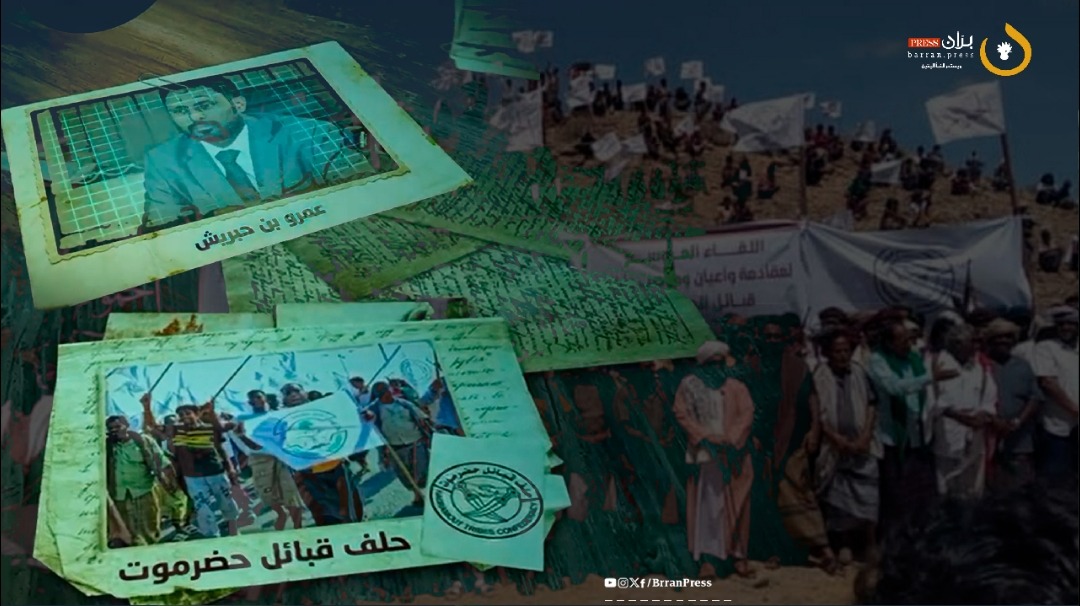


Barran Press
The Hadhramaut Tribes Alliance has established a new armed checkpoint in the Mukalla district, the capital of Hadhramaut Governorate (eastern Yemen), according to tribal sources.
A tribal source told "Barran Press" that the alliance erected the checkpoint on a main road west of Mukalla, describing it as a new escalation against the Presidential Leadership Council and the legitimate government aimed at pressuring them to respond to what the source called the demands of the people of Hadhramaut.
The source, who requested anonymity as they were not authorized to speak to the media, explained that the alliance erected the checkpoint to prevent the export or removal of Hadhramaut's wealth from the governorate, as a means to increase pressure on the Presidential Leadership Council to meet the demands of the people of Hadhramaut.
In a statement, the Hadhramaut Tribes Alliance said that the establishment of the military checkpoint west of Mukalla was intended to further exert pressure and preserve the wealth of Hadhramaut, preventing its removal and safeguarding its rights. The alliance affirmed its commitment to taking further escalatory steps on the ground, including a wider deployment, followed by a series of measures until all demands are met, according to the statement.
The alliance accused the President of the Presidential Leadership Council of continued intransigence, procrastination, and delay in meeting the legitimate demands of Hadhramaut. The statement asserted that the council's and the government's failure to respond to the demands of the people of Hadhramaut would only strengthen the alliance's resolve to achieve its objectives and the just demands of the people of the governorate.
This move comes amidst growing public unrest in Hadhramaut, fueled by deteriorating living conditions and services, a persistent decline in electricity, rising fuel prices, and a weakening Yemeni rial.
Local sources told "Barran Press" that the city of Ghayil Bawazir witnessed nighttime protests on Wednesday, resulting in road closures, gunfire, and the burning of tires, in protest of the deteriorating living conditions in the governorate.
Simultaneously with the new escalation by the Hadhramaut Tribes Alliance, the Hadhramaut Security Committee held a meeting in Mukalla on Thursday, chaired by the governor of the province and head of the security committee, Mabkhout bin Maadi. The meeting discussed measures to enhance security, combat crime, and apprehend lawbreakers, according to a security statement issued by the governorate's media office.
The meeting, according to the statement reviewed by "Barran Press," explored ways to strengthen coordination between military and security forces to enhance security and serve the best interests of the citizens.
In the middle of this week, Hadhramaut Governor, Mabkhout bin Madi, confirmed his keenness to meet the rights and demands of Hadhramaut and prevent any internal disputes or conflicts in the governorate.
Governor Mabkhout bin Madi has expressed his commitment to addressing the concerns of the people of Hadhramaut, emphasizing his desire to maintain peace and prevent internal conflicts. However, he acknowledged the province's vulnerability to the broader economic crisis, particularly the impact of the declining currency and rising cost of living.
The "Barran Press" report sheds light on the intricate dynamics behind the unrest, revealing a power struggle between the governor and Amr bin Habrish, the head of the Hadhramaut Conference and the Tribal Alliance. The report alleges that bin Habrish, who advocates for Hadhramaut's autonomy, has formed alliances with various local and regional actors, including the Mahra tribe, which opposes the Saudi military presence in their territory.
The report further suggests that Oman has been indirectly involved in Hadhramaut's affairs, allegedly financing bin Habrish to disrupt the province's stability and counter Saudi influence. Bin Habrish is also said to have forged ties with Faraj al-Bahsani, a member of the Presidential Leadership Council and deputy head of the Southern Transitional Council, who reportedly offered his support in exchange for working against President Rashad al-Alimi.
President al-Alimi, seemingly aware of the intricate machinations at play, has formed a presidential committee to address the concerns of the people of Hadhramaut. However, the report questions whether this move will be sufficient to curb the ongoing tensions and thwart the ambitions of those seeking to exploit the situation for their own gain.
The situation in Hadhramaut highlights the complex interplay of local, regional, and international forces vying for control over resources and influence. The outcome of this power struggle will have significant implications for the future of Yemen's stability and the potential for a lasting peace.